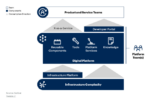The enterprise mobile testing industry has long been challenged with making mobile testing as agile, as flexible, as DevOps-ready as testing for the web and desktop is. The challenge that exists particularly in mobile is gaining access to testing and development resources, meaning devices themselves, and virtualization of those devices so they can be inserted into technology processes, versus just using the physical devices by hand and plugging them into a computer.
Teams of testers no longer have to be in the same physical location of the devices. Mobile Labs, Inc. has developed deviceConnect that knocks down this major barrier. Dan McFall, president of Mobile Labs, points out, “If you have an offshore strategy but your devices reside in a different office for security or network reasons, we solve that challenge and we open the device up as a platform for a variety of DevOps processes including automated testing. We make building and running scripts against mobile applications, as well as storing and managing those test case results possible, which accelerates mobile testing.”
Mobile Labs has always been focused on enterprise software. McFall says, “We’ve seen success because of the secure nature of our cloud products in the enterprise and in two vertical markets; namely the financial services and insurance vertical markets.” Recently, the company has seen an uptick in interest from the media/entertainment and technology markets.
Mobile Labs deviceConnect is available as an on-premises appliance, housed in a mobile cart, that creates a private mobile device cloud capable of managing all of an enterprise’s mobile testing assets in its own test lab. The patent-pending technology is highly secure because implementation occurs inside your enterprise’s corporate infrastructure, behind the firewall. deviceConnect is easy to install, manage and can be maintained remotely. The solution consists of a server running the deviceConnect software, and a configurable rack that you connect several mobile devices to.
Another option is going the deviceConnect hosted cloud route. “Technically there are no differences between the two products. It becomes a logistical difference. Everything we do in both instances are set up as dedicated environments,” McFall says. “The on-premises is set up with a database and the hosted environment uses a completely dedicated infrastructure so it’s all segmented.
The hosted cloud option provides customers with concierge-level services. Tasks like updating device OS levels and hardware management and updates are taken care of. For the on-premises option, Mobile Labs does things like customer-support and check-up, but the onus rests with the customer for device OS and hardware upgrades.
Integration flexibility and choice is an important aspect of any enterprise solution. Mobile Labs deviceConnect integrates with platforms like Jenkins and Urban Code so you can move mobile apps from the build system to the right real devices for testing, and eliminate having to manually install when they are ready. You can use deviceConnect’s command-line capability and RESTful API to script automated customizations for automated builds. In other words, new versions are instantly available for manual testing or continuous automated test, and you can retain older versions if you choose.
Automating the mobile test process is crucial to ridding the enterprise test lab of the existing chaos and confusion. Mobile Labs recognizes this and has been at the forefront of automation tool development since the company’s inception. McFall emphasizes, “MobileLabs has always taken a platform approach to automation. Devices are open to a variety of platforms. We want our customers to be able to move from manual to automated testing and to be able to make a sound strategy recommendation to them.”
“When we started Mobile Labs, the market leader in web and desktop testing was HP. It did not have a mobile component and was not capable of mobile automation so we wrote an add-in for it,” notes MacFall. Mobile Labs Trust, a certified add-in to HP’s Unified Functional Test (UFT), is an automated mobile app testing solution that tests automation frameworks on most mobile platforms and operating systems (OS’s.) Mobile Labs still supports it and recently wrote a significant update for it.
The Appium open-source project is becoming a market leader for mobile automation and Mobile Labs is committed to supporting the hundreds of customers who rely on it. According to McFall, “It does automation well but what it does not do well is device management, concurrent test runs, and it’s not easy to set up a server. We’ve taken over some degree of ownership and made it easier for companies to have an Appium strategy by embedding an Appium server on the deviceConnect, and we’re continually adding more tools to it to make it easier for the enterprise.”
“Bottom line? We make it possible to accelerate our customer’s mobile testing by allowing for automation with a wide variety of automation strategies,” says McFall.





